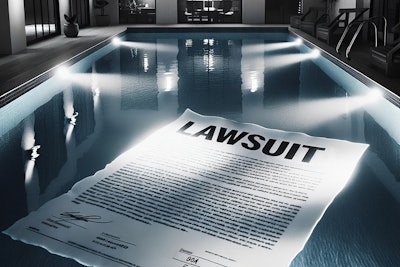
Just when you thought your pool company was doing fine, you get a knock on your door. Who could it be? You open the door to find your local sheriff handing you papers. You stare down at the header at the top of the page, and it reads, “RE: Notice of Intent to File a Lawsuit” in bold print.
Your blood runs cold, and your heart sinks as you read the complaint against your company. Of course, you know the named plaintiff — that’s a customer you’ve known for years. And you have a pretty good idea what it’s about: The complaint is a condition with the pool you didn’t bother to tell your former client about. Or maybe you did, just not in writing.
If you didn’t put it in writing — that notification of a dangerous condition existing in the customer’s pool — it turns into a swearing contest. You swear you did, they swear you didn’t, and you will lose as they simply state common sense dictates that if they knew a dangerous condition existed at the pool, they would have had it fixed. They’re not irresponsible morons.
[Side note: If you did put it in writing, well done, your attorney will be instantly granted your summary judgment motion to dismiss the suit, and you can go on your merry way. But this is a cautionary tale, so back to our story.]
No worries, you think, my insurance carrier will take care of the lawsuit. You call your carrier and email them a copy of the lawsuit. Keep your figures crossed they don’t immediately bounce back a reservation of rights letter, where they have placed your application for insurance under a microscope and found a tiny but clearly identified reason to deny coverage for this lawsuit. Because they’d rather not cover this lawsuit.
“We have determined,” their letter says, “that your application for insurance is inaccurate, and had we known of the inaccuracy, we wouldn’t have bound the policy and insured you. Therefore, we are denying coverage.”
“WTH?! What do I do now?!,” you ask the walls of your office.
“Well,” they say, “Now, you have to hire yourself a defense attorney and spend a lot of money on attorney fees and costs. And if you lose, or if it looks like you’re going to lose, you will have to pay an out-of-court settlement or a judgment. You will likely be dealing with the stress and business distraction of this lawsuit for a year or more. It will affect your personal and professional life.”
BUT — all this could have been avoided if you would have used a different form of CYA. Not Cyanuric Acid, but Cover Your Ass notification letters when you discovered anything approaching a dangerous condition at one of your pools.
These will prove, if you need to, that you notified the person or company responsible for the pool operations of the potential hazard. Make sure you store your copy safely in a file.
My company, Global Pools, sends CYA letters on a weekly basis to residential and commercial pool clients. I know it takes extra effort to do this, but we do it, because it Cs our A.
As pool company operators, we tend to overlook precautions against liability exposure because we already face seemingly insurmountable tasks just running our businesses. But lawsuits are a fact of life. And the best insurance against them is CYA letters, regular safety inspections, and incentives for your service techs to alert you to potential liability issues. Doing these things will substantially reduce your liability exposure.
This article first appeared in the September 2024 issue of AQUA Magazine — the top resource for retailers, builders and service pros in the pool and spa industry. Subscriptions to the print magazine are free to all industry professionals. Click here to subscribe.











































